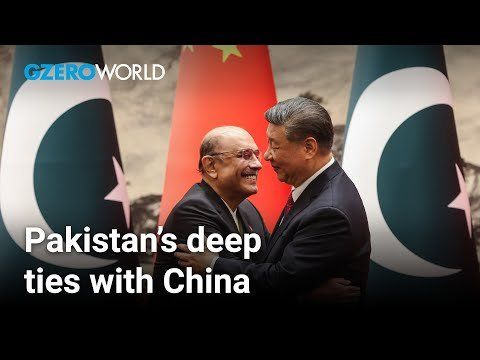August 18, 2025
Pakistan’s most important relationship may be its deep strategic partnership with China. The two countries have close security ties and economic alignment, especially when it comes to managing their mutual adversary India. On GZERO World, former Pakistani Foreign Minister Hina Khar gives her view on the China-Pakistan relationship, which she sees as a stabilizing force in Southeast Asia. Given so much geopolitical uncertainty right now, Khar explains, the world has just started noticing Pakistan and China’s strong ties. But the relationship goes back decades.
Khar says Pakistan doesn’t see the world in competing blocs, and believes there’s value in maintaining friendly relations with Western countries as well as its immediate neighbor, China. Beijing’s Belt and Road program has made significant investments in Pakistan, which has sped up Pakistan’s development and allowed it to strengthen economic partnerships with its neighbors. When multilateral institutions stopped financing infrastructure projects, China was able to provide goods and investment loans, helping to build trains and highways in Pakistan, as well as Iran, Afghanistan, and Uzbekistan.
“This is a country [the world sees] as very belligerent, very hegemonic. We’ve always seen in our region, an immediate neighbor to China, that it only relies on economic relationships,” Khar says, “Within Pakistan and the broader region, China has been a force of stability.”
GZERO World with Ian Bremmer, the award-winning weekly global affairs series, airs nationwide on US public television stations (check local listings).
New digital episodes of GZERO World are released every Monday on YouTube. Don't miss an episode: subscribe to GZERO's YouTube channel and turn on notifications (🔔). GZERO World with Ian Bremmer airs on US public television weekly - check local listings.
More For You
As expected, the Supreme Court struck down the bulk of Donald Trump's sweeping “Liberation Day” tariffs as illegal … and almost nothing changed.
Most Popular
What's Good Wednesdays
What’s Good Wednesdays™, February 25, 2026
Sponsored posts
Small businesses at a crossroads
Chris, an Army veteran, started his Walmart journey over 25 years ago as an hourly associate. Today, he manages a Distribution Center and serves as a mentor, helping others navigate their own paths to success. At Walmart, associates have the opportunity to take advantage of the pathways, perks, and pay that come with the job — with or without a college degree. In fact, more than 75% of Walmart management started as hourly associates. Learn more about how over 130,000 associates were promoted into roles of greater responsibility and higher pay in FY25.
Ukraine's President Volodymyr Zelenskiy, Finland's President Alexander Stubb, Estonia’s Prime Minister, President of the European Commission Ursula von der Leyen and other European leaders visit memorial to fallen Ukrainian defenders at the Independent Square on the fourth anniversary of Russia's full-scale invasion, in Kyiv, Ukraine February 24, 2026.
Ukrainian Presidential Press Service/Handout via REUTERS
Somewhere in the Donbas region, Ukrainian soldier Artem Bondarenko says he hasn’t slept through the night in months as he defends Eastern Ukraine.
- YouTube
In the latest episode of Vladimir Putin and Xi Jinping's hit wellness podcast This Authoritarian Life, we learn how positive communication patterns can break negative cycles in our relationships -- especially our relationships with Iran, Syria, Venezuela, and Cuba. #PUPPETREGIME
© 2025 GZERO Media. All Rights Reserved | A Eurasia Group media company.
